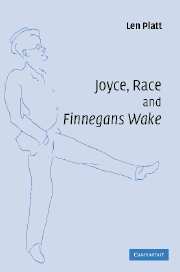Book contents
- Frontmatter
- Contents
- List of abbreviations
- 1 Joyce, race and racism: introduction
- 2 ‘No such race’: Finnegans Wake and the Aryan myth
- 3 Celt, Teuton and Aryan
- 4 ‘Our darling breed’: the Wake, social Darwinism and eugenics
- 5 Atlanta-Arya: theosophy, race and the Wake
- 6 ‘Hung Chung Egglyfella’: staged race in Ulysses and the Wake
- 7 ‘And the prankquean pulled a rosy one’: filth, fascism and the family
- 8 Race and reading: conclusion
- Notes
- Index
2 - ‘No such race’: Finnegans Wake and the Aryan myth
Published online by Cambridge University Press: 22 September 2009
- Frontmatter
- Contents
- List of abbreviations
- 1 Joyce, race and racism: introduction
- 2 ‘No such race’: Finnegans Wake and the Aryan myth
- 3 Celt, Teuton and Aryan
- 4 ‘Our darling breed’: the Wake, social Darwinism and eugenics
- 5 Atlanta-Arya: theosophy, race and the Wake
- 6 ‘Hung Chung Egglyfella’: staged race in Ulysses and the Wake
- 7 ‘And the prankquean pulled a rosy one’: filth, fascism and the family
- 8 Race and reading: conclusion
- Notes
- Index
Summary
— Tallhell and Barbados wi ye and your Errian coprulation! Pelagiarist! … Y'are absexed, so y'are, with mackerglosia and mickroocyphyllicks
James Joyce, Finnegans Wake, 525.5–6‘ARYANIA’
It could be argued that ideas of race have always been at the centre of the Western academy. The historian Léon Poliakov would go even further. ‘The search for origins,’ he writes, ‘the attempt to find one's identity through one's ancestors, has always been the concern of human groups in every age and culture.’ Such an idea, incidentally, has an obvious bearing on Ulysses, a ‘novel’ which in many critical traditions is understood precisely as a search for origins. Stephen Dedalus's Japhetic search for a father, imaged in the contemplation of his navel as a direct link to Adam (see U, 3.39–44), is an initial frame for a narrative often described, certainly in older critical traditions, in terms of a ‘meeting’ between Stephen the son and Bloom the father. It could be argued that what Stephen expresses here, though individualised and acculturated as the identity crisis of a young man caught between Irish and English traditions, is more substantially suggestive of a generalised condition. This would involve a sense of identity more primal than individualised or ‘postcolonial’, one perhaps related to the kind of informalities often implicated in the Wake, ‘the sort of softball sucker motru used to tell us when we were all biribiyas or nippies and messas’ (114.26–28).
- Type
- Chapter
- Information
- Joyce, Race and 'Finnegans Wake' , pp. 14 - 41Publisher: Cambridge University PressPrint publication year: 2007



